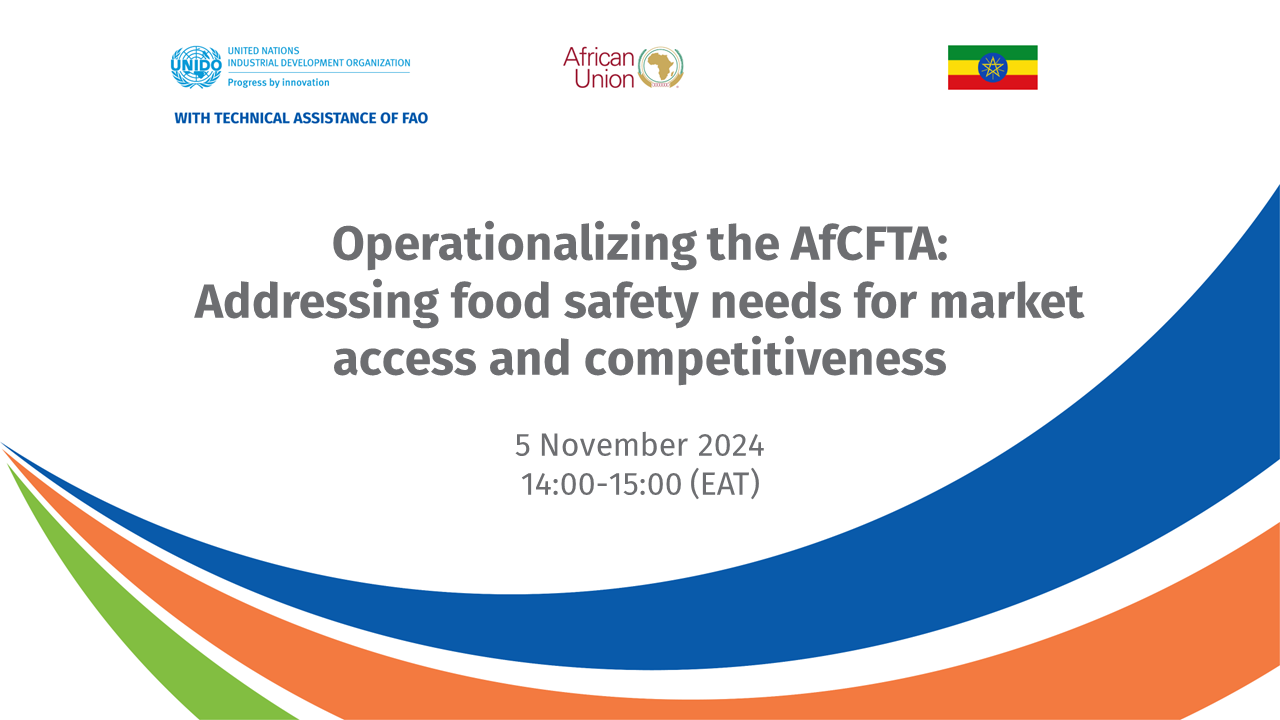


The issue:
The African Union (AU) considers agriculture as an engine to realize the vision enshrined in Agenda 2063, especially given its importance in food security and poverty alleviation. The African Continental Free Trade Area (AfCFTA) is a significant step toward economic integration across Africa, aiming to create a single market for goods and services and enhancing ease of cross-border trade. Operationalizing the AfCFTA entails addressing several challenges and opportunities at the national, regional, and continental levels. One of these is to ensure that food and agri-food products meet international standards.
African countries are demonstrating an increasing commitment to modernizing and enhancing their agricultural output and food and agri-food production; this is expected to have important positive impacts on national economies as a whole. The potential for growth of intra-continental trade in food and agri-food products is estimated to be exponential. In order to realize it, enhanced alignment of sanitary and phytosanitary (SPS) measures across diverse regulatory environments is a must. Modernization of food safety policy and regulatory frameworks, and operationalization of science and evidence-based practices such as risk-based inspection are also crucial. Overall, actualizing the AfCFTA requires that measures be taken to strengthen the food safety systems by both, public and private sectors.
The AU has approved two key policy documents which aim at improving food safety and broader SPS capacities in the continent, namely the Sanitary and Phytosanitary (SPS) Framework for Africa and the Food Safety Strategy for Africa (2022-2036). The SPS Continental Forum, and the Africa Food Regulatory Authorities Forum (AFRAF) and the AfCFTA Sub-Committee for SPS Measures, have been set up to monitor and review the implementation of the SPS Protocol. These fora play an essential role in ensuring coherence and harmonization at the continental level and for coordination among SPS capacity-building initiatives. They also offer a platform for dialogue among food safety competent authorities, including dissemination and propagation of best practices.
Technological innovations must also be leveraged in order to ensure that the public sector and agri-businesses can benefit from operationalizing the AfCFTA. Digital solutions and real-time data sharing can streamline documentation processes related to food safety. They also help track food products along the supply chain, and ensure transparency. This in turn leads to reduced risk of food contamination and fraud, assuring consumers of the quality and safety of food products.
Objectives:
This session will:
Review past accomplishments and identify the needs, challenges, and opportunities for continued improvements in food safety and SPS compliance capacities across the Continent.
Help chart a path towards continued investment in synergetic initiatives, such as the AFRAF and the Africa Food Safety Agency, as they contribute to the elimination of trade impediments and act as enablers for Africa's food and agri-food market integration.
Key guiding questions:
What has been accomplished in support of the alignment of SPS measures among African countries to enable the implementation of the AfCFTA, and what are the lessons learnt from initiatives underway in Africa and other parts of the world?
How can the long-term viability of lasting mechanisms of collaborative leadership such as the AFRAF be ensured?
How can digital solutions and innovative approaches to implement conformity assessment (e.g. remote audit, inspection, and electronic certification), improve food safety practices in Africa and contribute to added consumer confidence and market access for African products?
What are the positive implications and potential issues for food security which increased food trade can have on the continent?
Expected outcomes:
Identification of potential future partnerships and innovative digital solutions to improve food safety and SPS capacities and practices.
A formal announcement of the Vienna Food Safety Forum (VFSF) 2025.
Session format and structure:
The session will be a moderated discussion with international experts from the food safety regulatory community who will spotlight best practices and lessons learned from other countries and regions. Speakers will also discuss emerging regulatory trends, highlighting the ongoing work on international best practices developed by regulators from the Codex Alimentarius Commission.
Opening remarks and moderation by

Mr. Samuel Godefroy, President of the Global Food Regulatory Science Society (GFORSS) and President Elect, International Union of Food Science and Technology
Samuel Godefroy is the former Director General of Health Canada’s Food Directorate, Canada’s Food Standard Setting body and a former Vice Chair of the FAO/WHO Codex Alimentarius Commission. Dr. Godefroy has over 25 years’ experience in food regulatory science and policy including 15 years, at the Executive level leading food regulatory teams and organizations at Health Canada
Prof. Godefroy is the founder and the current president of the Global Food Regulatory Science Society, a non-for-profit organization, aiming to promote food regulatory science disciplines at the international level. Prof. Godefroy is the President Elect of the International Union of Food Science and Technology IUFoST (2024-2026). Samuel is currently Full Professor of Fod Risk Analysis and Regulatory Policies in the Department of Food Science, Faculty of Agriculture and Food Sciences, Université Laval, Québec, QC, Canada and is leading the development of a Food Risk Analysis and Regulatory Excellence Platform (PARERA), hosted by the Institute of Nutrition and Functional Foods (INAF) of Université Laval.
Speakers

Mr. Amare Ayalew, Senior Advisor, African Union Commission
Dr. Amare Ayalew is Manager of the Partnership for Aflatoxin Control in Africa (PACA) at the African Union Commission. Dr. Ayalew has over 30 years of professional experience in mycotoxicology, and more broadly food safety and sanitary and phytosanitary matters. For the past 11 years, he has led PACA’s strategy, launch of regional and country programs, including development of government-led and stakeholder-aligned national aflatoxin control/food safety master plans across Africa. He also led the development, implementation and validation of the Africa Food Safety Index tracked in 55 AU Member States and the drafting of the Statute of the Africa Food Safety Agency. He is leading the development of an Africa Food Safety Data Hub.

Mr. Tareq El-Houby, Co-Chairman of the Africa Food Regulatory Authorities Forum and Chairman of the Board of Directors, National Food Safety Authority of Egypt
Dr. Tareq El-Houby serves as the Chairman of the Board of Directors of the National Food Safety Authority since 2022 after being nominated by the Prime Minister of Egypt. He is a highly accomplished professional with an impressive academic background and over 40 years of experience in the food industry. In this pivotal role, he continues to champion food safety and regulatory compliance, ensuring the highest standards are met to protect public health and facilitate the access of the Egyptian exports to the international markets.

Ms. Diana Akullo Ogwal, Principal SPS Officer, Directorate of Trade in Goods and Competition, AfCFTA Secretariat
Dr. Diana Akullo Ogwal is the Principal Officer - Sanitary and Phytosanitary (SPS) measures at the African Continental Free Trade Area (AfCFTA) Secretariat. She supports implementation of three AfCFTA Annex 5 on NTBs, Annex 6 on TBTs, and Annex 7 on SPS. She previously coordinated the AUC’s work SPS including building SPS capacities of AU Member States. She holds a doctorate degree from Walden University, USA, Masters in Development Studies from the University of East Anglia, UK and Bachelors degree from Makerere University, Uganda.

Ms. Meseret Bekele, Director General for Ethiopian Standard Institute
Dr. Meseret Bekele holds a Bachelor’s degree in Chemical Engineering and a Master’s degree in Food Process Engineering from Addis Ababa University, as well as a Ph.D. in Chemical and Process Engineering from the Karlsruhe Institute of Technology (KIT) in Germany. With over a decade of experience in academia, Dr. Bekele has served as a teacher, researcher, department head, and Associate Dean at Addis Ababa Science and Technology University.
Dr. Bekele has published extensively in the fields of food safety and processing. They also bring two years of industry experience as a junior expert. Dr. Bekele is certified in Food Safety Management Systems (ISO 22001) and Quality Management Systems, and has completed ITP Food Safety training at Ghent University in Belgium. Since January 2022, Dr. Bekele has been serving as the Director General of IES.